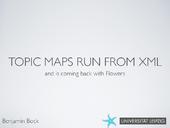Topic Maps run from XML and is coming back with Flowers
Proceedings Paper, was published by Benjamin Bock, Sven Krosse, and Lutz Maicher at 2010-03-13
External Link: more information
In its history, Topic Maps developed from a syntax-based standard to a pure data model without any syntax defined within its core data model. The syntaxes defined by the ISO for the exchange of Topic Maps are conforming to the generic data model, one of them, XTM, being based on XML. The usage of XTM without a Topic Maps engine is cumbersome because of the generalized schema and the merging rules. For example, extracting useful information from XTM using XSLT requires to query for the typing topics, which is a new subquery just for selecting the right subject whereas it was the entity name in a domain specific XML format. Querying the properties, called Names and Occurrences in Topic Maps, requires additional subqueries because their types and scopes are again Topics and not simple XML entity- and attribute names. The Topic Maps Query Language which is the latest draft in the ISO standardization presented here allows formulating queries against a Topic Maps store in a concise way and outputting the result in various representations. Our implementation TMQL4J uses any TMAPI-compatible store to operate on and allows optimized queries and outputting domain-specific XML. This is demonstrated by generating an ATOM feed for the subject identity record service subj3ct.com.
Authors
Benjamin Bock
http://twitter.com/bnjmnbck

Benjamin is project leader of Ruby Topic Maps and rtm-tmql.
Sven Krosse
krosse@informatik.uni-leipzig.de

Sven is project leader of TMQL4J, MaJorToM, and Live Integration Framework.
Lutz Maicher
http://www.lutzmaicher.de/

Lutz is project leader of Musica Migrans, Topic Maps Lab Community.. , and Repertoire of the St. Thomas.. . He is involved in yacca.me and Maiana.
Projects
Subj3ct
is a PSI registry service.

Subj3ct is an infrastructure technology for Web 3.0 applications. These are applications that are organised around subjects and semantics rather ...
Visit homepage of Subj3ct
TMQL4J
is a Utilities and Components.

The tmql4j engine is the first Java-based engine processing the topic maps query language. The engine is designed as processing chain of independent ...
Visit homepage of TMQL4J
Ontopia
is a Topic Maps Framework.

Ontopia is a complete set of open source tools for building, maintaining, and deploying Topic Maps-based applications.
Visit homepage of Ontopia
glossary
TMDM
is associated with 29 items.

TMDM is the abbreviation for Topic Maps Data Model. You will find a compact illustration of all relationships within the TMDM …
This publication cites the following publications

JRuby Topic Maps
by Arnim Bleier, Benjamin Bock, and Uta Schulze, ...
Topic Maps is an excellent paradigm to support human thinking and to visualize networked information. As part of my PhD project, I therefore chose Topic Maps as the conceptual foundation for designing and implementing a software prototype for semantic knowledge retrieval.








